What Does “Dui Bu Qi” Mean?
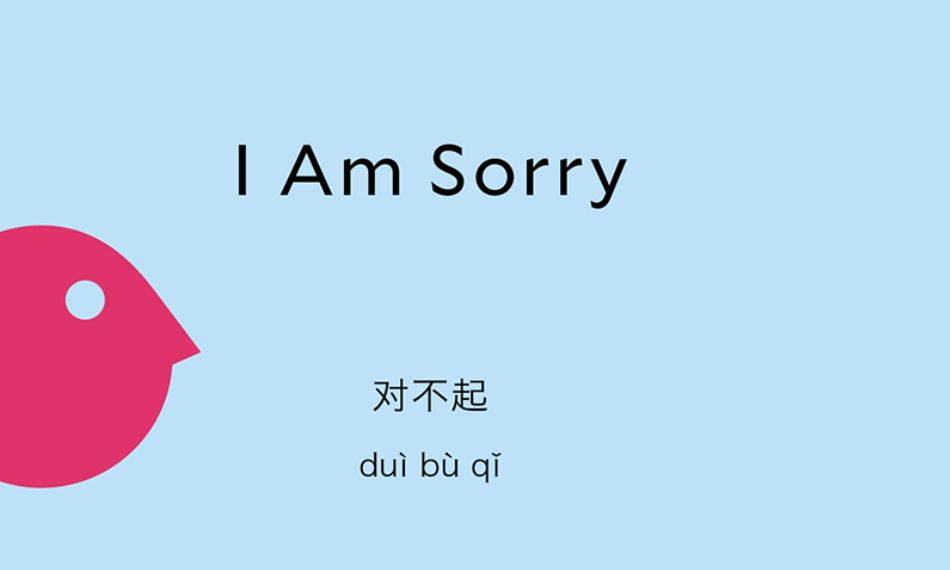
If you already know how to say “Thank you” in Chinese, then learning how to say “Sorry” is also a must. And “Dui bu qi” (对不起) is part of that. This phrase directly translates to “Sorry” or “I apologize.” Each character carries its own meaning:
-
对 (duì): means “to face” or “correct.”
-
不 (bù): means “not.”
-
起 (qǐ): literally means “to rise” or “to begin,” but in this context, it conveys the sense of “being able.”
Pronunciation
-
Pinyin: |duì bù qǐ|
-
Tone marks: falling-rising, falling, rising (4th – 4th – 3rd tones).
-
To sound natural, pronounce it smoothly with a gentle tone, especially in casual conversations.
How to Write
The phrase is written in simplified Chinese as: 对不起. Together, these characters form the most common way to say “Sorry” in Chinese.
-
对 = duì
-
不 = bù
-
起 = qǐ
When to Use “Dui Bu Qi”
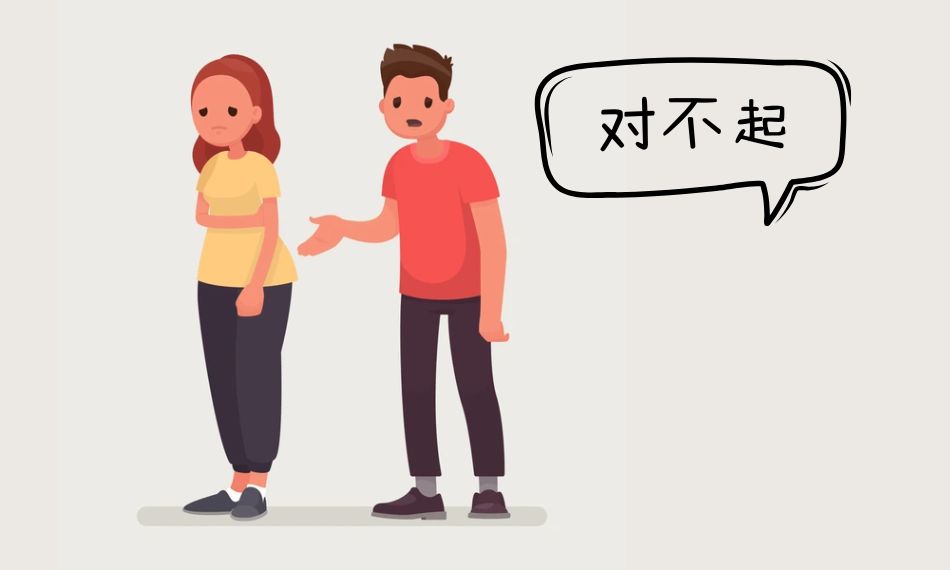
This phrase is appropriate in a wide range of situations. You can use it when:
-
Accidentally bumping into someone on the street.
-
Arriving late to a meeting or class.
-
Forgetting an appointment or task.
-
Interrupting someone in conversation.
-
Making a mistake that affects another person.
For serious mistakes, “Dui bu qi” may be combined with further explanations. In lighter cases, Chinese people might skip apologizing altogether, as apologies are often reserved for situations that truly require them.
See more: Congratulations in Chinese
How to Use “Dui Bu Qi”
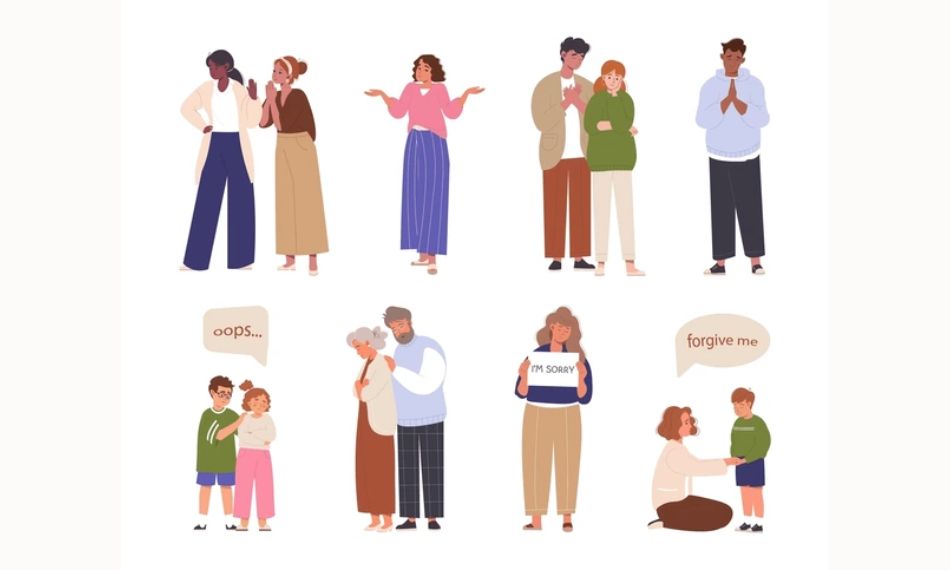
Use “Dui Bu Qi” as a Standalone Sentence
对不起 (duì bu qǐ) is the most common and standard way to say “Sorry” in Chinese. Literally, it means “cannot face (you)”, which reflects a sense of guilt or shame for having done something wrong. This phrase is polite and formal, and it’s suitable for a wide range of situations, from accidentally bumping into someone on the street to apologizing for being late or expressing regret for making a mistake in work or study.
Combine “Dui Bu Qi” with Other Sentences
The phrase can stand alone, but it’s even more useful when combined with other sentences. By practicing these common patterns, learners can use “Dui bu qi” naturally in daily conversations.
-
对不起,我迟到了。
Duì bù qǐ, wǒ chí dào le. → Sorry, I’m late. -
对不起,我忘记了。
Duì bù qǐ, wǒ wàng jì le. → Sorry, I forgot. -
对不起,我听不懂。
Duì bù qǐ, wǒ tīng bù dǒng. → Sorry, I don’t understand. -
对不起,打扰一下。
Duì bù qǐ, dǎ rǎo yí xià. → Sorry, may I disturb you for a moment? -
对不起,这是我的错。
Duì bù qǐ, zhè shì wǒ de cuò. → Sorry, this is my fault. -
对不起,我不能去。
Duì bù qǐ, wǒ bù néng qù. → Sorry, I can’t go. -
对不起,请再说一遍。
Duì bù qǐ, qǐng zài shuō yí biàn. → Sorry, could you say it again?
Alternatives to “Dui Bu Qi”
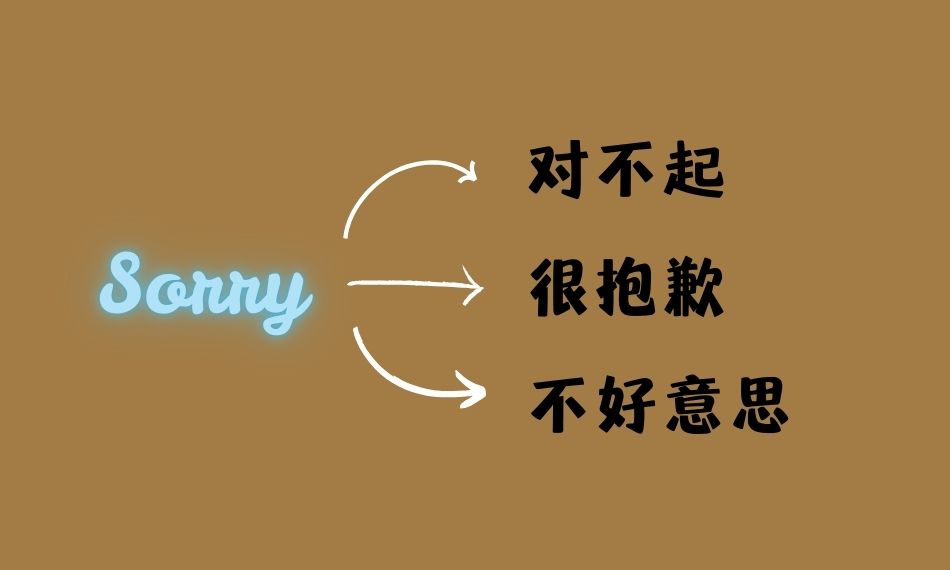
While this is the most common way to apologize, Chinese also offers other ways to say “Sorry” that better fit different contexts. By learning these alternatives, you can sound more natural and polite in every situation.
-
抱歉 (bào qiàn): This is a formal way to say “Sorry,” often used in professional or written settings. For example: 抱歉,会议被推迟了 (Bào qiàn, huì yì bèi tuī chí le) → Sorry, the meeting has been postponed.
-
不好意思 (bù hǎo yì si): This phrase expresses mild apology or embarrassment, often when you need help or inconvenience someone. For example: 不好意思,可以帮我一下吗? (Bù hǎo yì si, kě yǐ bāng wǒ yí xià ma?) → Excuse me, could you help me?
-
劳驾 (láo jià): This polite phrase is used like “excuse me,” especially when asking someone to move or assist you. For example: 劳驾,让我过去一下 (Láo jià, ràng wǒ guò qù yí xià) → Excuse me, please let me pass.
-
请原谅 (qǐng yuán liàng): This is a more formal way of saying “please forgive me,” often used for serious mistakes. For example: 请原谅我的迟到 (Qǐng yuán liàng wǒ de chí dào) → Please forgive my being late.
-
歉意 (qiàn yì): Literally meaning “apology,” it often appears in written or official contexts to express regret. For example: 向您表达我的歉意 (Xiàng nín biǎo dá wǒ de qiàn yì) → I express my apologies to you.
-
实在抱歉 (shí zài bào qiàn): A stronger version of bào qiàn, used to emphasize sincerity. For example: 实在抱歉,给您带来麻烦了 (Shí zài bào qiàn, gěi nín dài lái má fan le) → I’m truly sorry for causing you trouble.
-
真不好意思 (zhēn bù hǎo yì si): An intensified form of bù hǎo yì si, showing genuine embarrassment. For example: 真不好意思,让你等了这么久 (Zhēn bù hǎo yì si, ràng nǐ děng le zhè me jiǔ) → I’m really sorry to have kept you waiting.
-
请见谅 (qǐng jiàn liàng): Similar to “please excuse me,” this is often used politely in both spoken and written Chinese. For example: 第一次做主持人,请大家见谅 (Dì yī cì zuò zhǔ chí rén, qǐng dà jiā jiàn liàng) → It’s my first time hosting, please excuse me.
-
失礼了 (shī lǐ le): This phrase means “I was impolite,” used in formal or traditional settings. For example: 刚才没有注意到您,失礼了 (Gāng cái méi yǒu zhù yì dào nín, shī lǐ le) → I didn’t notice you just now, that was impolite of me.
-
打扰了 (dǎ rǎo le): Literally “I disturbed you,” this phrase is polite when interrupting or leaving. For example: 打扰了,我先走了 (Dǎ rǎo le, wǒ xiān zǒu le) → Sorry for disturbing, I’ll leave now.
Cultural Notes: Saying “Sorry” in Chinese
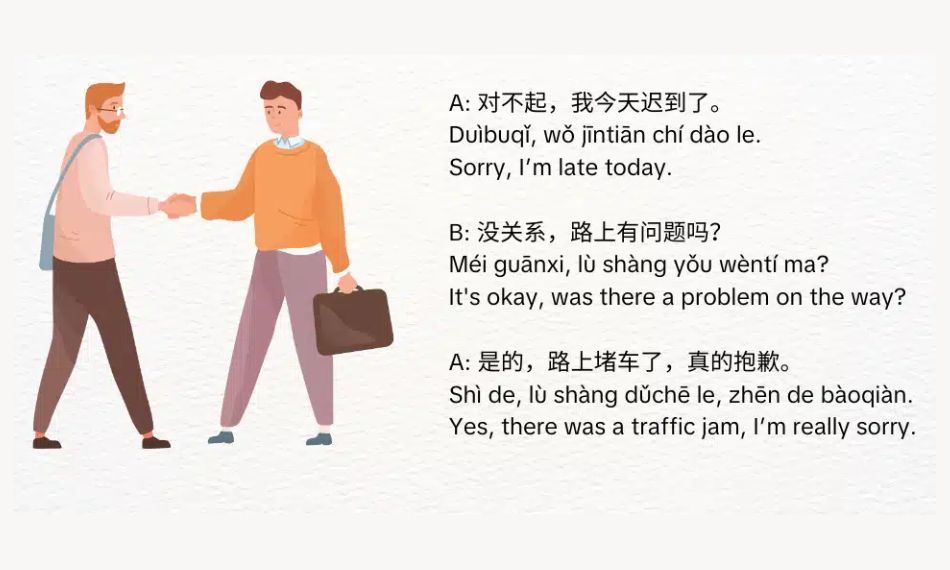
The phrase “Dui bu qi” carries cultural weight in China, making it different from how “Sorry” is used in English. Learners who use this phrase correctly will sound more natural and respectful in daily conversations.
- In Chinese culture, apologies are not used casually but reserved for situations where real responsibility is involved.
- While English speakers may say “Sorry” often, Chinese speakers usually prefer other expressions for minor inconveniences.
- For small requests, interruptions, or mistakes, people often use 不好意思 (bù hǎo yì si) instead of “Dui bu qi”.
- Saying “Dui bu qi” too often can make learners sound overly apologetic or even insincere in Chinese contexts.
Conclusion
“Dui bu qi” is more than just an apology – it’s a key to a deeper cultural connection. Mastering phrases like this helps you sound natural and confident in conversations. Ready to expand beyond the basics? Start your journey to fluency today and learn Chinese with GuruLango.
FAQs
1. How to respond to “Dui bu qi”?
You can reply with “Méiguānxì” (It’s okay/No problem), which is the most common response. If you want to sound extra friendly, you can also say “Bù yàojǐn” (Don’t worry about it). Both show that you’re not upset.
2. What does “Dui bu qi” mean?
“Duì bù duì” literally means “Right or not?” and is often used to confirm something. It’s similar to asking “Is that correct?” in English. People use it casually in conversations to check if the other person agrees.
3. What is the difference between “Dui bu qi” and “Bu Hao Yi Si”?
Both can be translated as “Sorry”, but they’re used a bit differently. “Duì bù qǐ” is a formal apology when you’ve made a mistake or caused trouble. “Bù hǎo yì si”, on the other hand, is softer and often used for small embarrassments, like bumping into someone or asking a small favor.